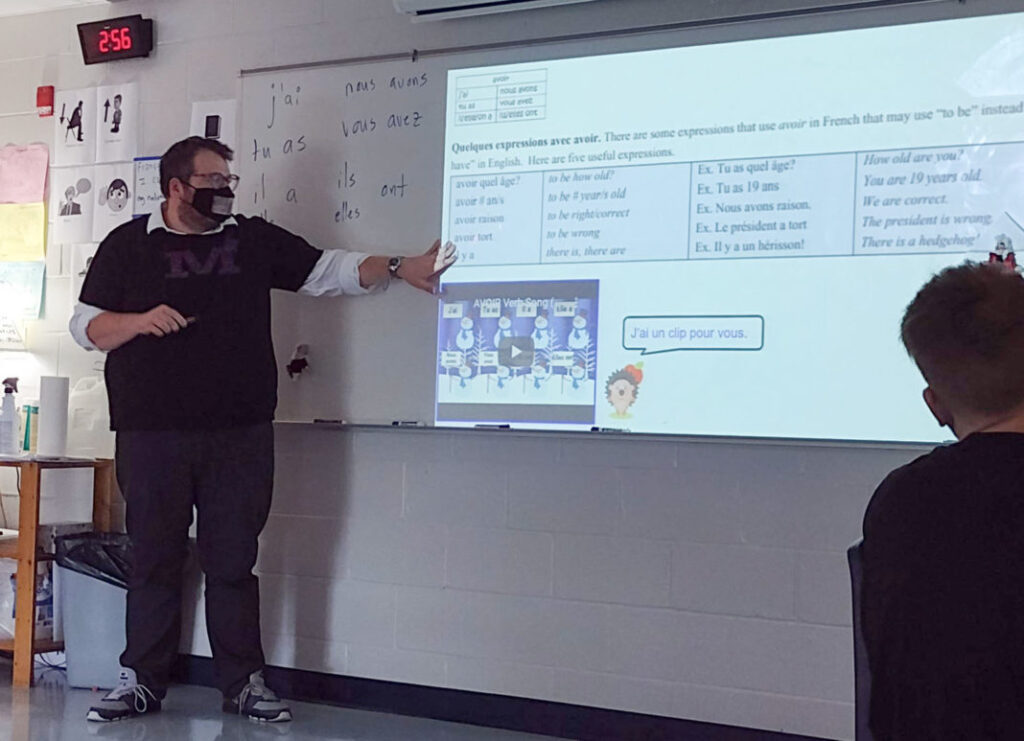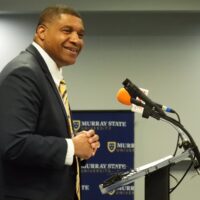Willie Carver was at the pinnacle of his career.
An educator with decades of experience teaching at the sole high school in mostly rural Montgomery County, Kentucky, Carver was named the 2022 Kentucky Teacher of the Year.
“The best thing about teaching is you get lost in the process,” said Carver upon receiving the award last September. “It’s all about what the students do.”
Now, less than a year later, Carver has walked away from the profession he loved and excelled at — and ignited a national conversation about the treatment of LGBT teachers and students, especially in conservative suburban and rural districts.
“Staying makes it seem as if it’s doable,” he told the Daily Yonder. “And to me, it’s gotten to a point where it isn’t.”
This from a man who did not expect small-town America to be a utopia in the first place.

“I don’t think it ever occurred to me that this would be easy or that I can be happy,” Carver said. The past year, however, made his remaining at Montgomery County High School in Mt. Sterling untenable, he said.
Across the country, schools have become the latest political battleground. From Florida’s “Don’t Say Gay” law to the debate around Critical Race Theory and the removal of books from the curriculum — such as the controversy over “Maus” earlier this year in Athens, Tennessee — teachers have been caught in a cultural crossfire.
Carver said his problems did not stem from a single parent with a soapbox but resulted from the failure of the school’s administration to stand up for teachers against baseless and offensive allegations. For example, after Carver showed a TedTalk by “a woman … who looked masculine” one parent was angry because their child said “’they’re making us watch trans people.’” The TedTalk presenter was not trans, Carver said.
Another parent objected to a reading by a Black author.
He said such complaints were not-so-thinly veiled examples of racism and homophobia.
“The justifications are never that” the authors are Black or LGBTQ, he said.
“The justifications are that there’s a curse word or that there’s something sexual or something like that.” But taken together, the complaints were about race and gender issues.
“I did not become a teacher to pacify racists,” Carver said. “I became a teacher to ensure that everyone in my class has the opportunity to become a better person, to survive childhood, and do great things in their lives, to support them, to make them feel seen … to instill in them the feeling that the world wants them. And how can I do that if I’m actively hiding them because there’s some racist in town?”
Sometimes, Carver said, the pressures on him were subtle. At other times, it was obvious that he was being targeted. In one instance, a quiz he gave his students where they were made to determine if a quote was from the philosopher Friedrich Nietzsche or a country music song invoked the ire of the administration and parents because he included a Dolly Parton quote:
“It’s a good thing I was born a girl, otherwise I’d be a drag queen.”
“I had three meetings over this,” Carver says, “and so something that’s silly becomes not silly because suddenly you’re having to stop your class and print copies of a quiz while the principal frowns at you … Suddenly you’re having to meet with the superintendent.”
Perhaps the worst experience Carver had was when a group he advised, Open Light, came under attack from a woman who accused Carver of using it to manipulate students and groom them for exploitation. Though LGBTQ-affirming, Open Light is not a gay-straight alliance but rather a group “dedicated to positive systemic change,” Carver said. Students chose their own projects, such as teaching themselves women’s history, cleaning up parks, and raising money for mental health awareness.
The woman began a social media campaign against the group, Carver said, including targeting former students of the group.
“My students are scared. Their parents start reaching out to me saying, ‘can anything be done?’ I reach out to the superintendent, I think, three times and ask for him to please do something…”
The superintendent admitted in an email that the allegations were false, Carver said, but did nothing to publicly support Carver or the students of Open Light. Insisting the school could not get involved “every time someone has a complaint,” Carver says he was instructed to call the police if he felt unsafe.
“I personally felt that someone doxing students and a faculty member and making accusations of this nature requires a response,” Carver says.
In an email to the Daily Yonder, Montgomery County School District Superintendent Matthew D. Thompson said, “Mr. Carver is a wonderful English and French teacher. We wish him well in his new endeavor.” He did not comment on Carver’s complaints.
Despite not feeling supported by the administration and dealing with baseless accusations, it wasn’t until Carver won Teacher of the Year that he realized just how bad things had gotten, he said.
“Suddenly I was in spaces where people were paying me to speak, or where I was speaking with the most important people in the field of education in my state and in the nation, and yet I wasn’t allowed to speak to the superintendent. Or when I spoke, I was shut down. So, the discrepancy… was making it really hard to feel like a cohesive person anymore.”
That “discrepancy” in treatment is ultimately what drove Carver from the classroom and into a job at the University of Kentucky.
Carver’s departure comes at a time when a shortage of teachers and principals is disproportionately affecting rural schools, according to a brief published by the National Conference of State Legislators. Thirty-nine percent of schools that are more than 25 miles from an urban center are struggling to fill vacancies, the brief said. Enrollment in teacher training programs is declining nationally. The attritition rate in rural schools is higher. And lower starting salaries for rural teachers makes recruitment harder, the brief said.
Carver said the only way some districts will improve in their treatment of LGBTQ teachers is for good teachers to work there and challenge the system. But he cautions teachers to know their limits, as he did.
“We have to have [teachers] who are willing to take on that pain and hurt” to change school environments, he said. “I don’t know how we can’t morally ask people to do that, though.”
Skylar Baker-Jordan is a freelance writer whose work has appeared in The Independent, Newsweek, Business Insider, and elsewhere. He is contributing editor for community engagement at 100 Days in Appalachia and currently lives in East Tennessee.






